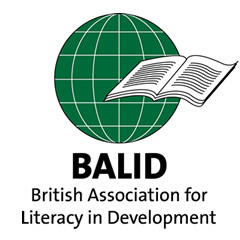|
Greetings from BALID.
We trust that everyone that participated enjoyed the recent Informal Literacy Discussion (ILD) "Using Visual and Sensory Literacies in Refugee Research and Practice". It was a rich and interactive time of reflection on the role of non-print literacies in communication, particularly in refugee contexts. You can access the recording of the event here.
An invitation in 'Seeing and Sensing'...
Following our recent Informal Literacy Discussion on using visual and sensory literacies in refugee research and practice we'd like to invite you to contribute a blog post for our forthcoming special Seeing and Sensing Blog-series via the BALID blog. Mary-Rose, Arianna, and Katie will all be contributing a post over the coming weeks to follow-on from their interactive sessions. Mary-Rose would like to this to become a collaborative dialogue in which we can all learn from one another's experiences.
Some ideas for the blog contributions could (but are not restricted to) include: sharing your own practice and/or research experiences in visual and sensory modes; reflecting on some of the interactive elements of the ILD, such as Mary-Rose's olfactory-memory activity, Arianna's body percussion connected to the memory, or Katie's word cloud; thoughts on future thinking as to how you might take some of the ideas forward; or perhaps sharing a visual artefact you have noticed in your environment that you would like to share.
Please email Mary-Rose at [email protected] if you would like to contribute.
|
|
|
|
Online Informal Literacy Discussion
|
|
|
|
Save the Date: Friday, 8th July, 1200 - 1330 UK
Online Informal Literacy Discussion
Title: Leveraging the wisdom of networking: Implications from Chinese international students’ translanguaging practices in the UK
Register here
(https://www.eventbrite.co.uk/e/leveraging-the-wisdom-of-networking-for-c...)
Pingping Xie from Queens University Belfast will discuss insights on online translanguaging practices of Chinese university students in the UK. As international students, their relationship with English has shifted from that of foreign language learners to second language users. Learning continues to take place in ways that are far removed from the language classroom through, among other things, translanguaging practices in networked interaction. Adopting literacy as social practice as the theoretical framework, she will review ways in which Chinese international students take advantage of networking opportunities while studying in the UK and how they treat social events as language learning opportunities, especially regarding their translanguaging practices on social media.
|
|
|
|
Remembering Brian Street
Brian Street, past President of BALID, was a leading figure in New Literacy Studies and drew upon his anthropological background to introduce the idea of literacy as a social practice. Throughout his life he worked tirelessly both to promote anthropology, driven by a strong commitment to social justice and widening participation in public education. His work always sought to uncover power relations, from his analysis of representations of ‘otherness in early ‘ethnographic novels’, to questioning the meaning of academic literacies as ‘appropriate writing’ in institutions such as universities. The journal "Teaching Anthropology" has issued a memorial issue to honour Brian Street. It contains a number of articles which will be of interest to BALID members. It is open access and can be found here: Vol. 11 No. 1 (2022): Brian Street Memorial Issue | Teaching Anthropology
|
|
|
|
Supporting Community Learning in Mozambique
BALID member, Katy Newell-Jones, has been supporting MICAIA in Mozambique develop their informal, community-based approach to literacy and numeracy. MICAIA has made significant progress, despite the immense challenges of COVI19 and the impact it has had on the social movement, trade and economy of Mozambique. Click here to see the exuberant reaction of one community woman as she signs her name for the first time at her savings group meeting. Katy will be visiting MICAIA in April and is looking forward to meeting the MICAIA team and some of the women’s groups at the heart of MICAIA’s programme.
|
|
|
|
BALID at 2nd GALACST Conference, Manila, Philippines
Members of BALID were pleased to participate in a couple of events as part of 2nd International Conference on Gender, Adult Literacy and Active Citizenship for Social Transformation (GALACST) last March 25-26, 2022 via Zoom. GALACST was hosted by the University of Santo Tomas and co-hosted by BALID Institutional Member Transformare in the Philippines. It was also conducted in collaboration with the University of East Anglia UNESCO Chair which is also a BALID Member.
The theme of this year’s conference was ‘Bolstering intergenerational learning toward inclusive, innovative, and sustainable communities amidst the COVID-19 pandemic”. Chris Millora, BALID Chair, delivered a plenary talk entitled ‘Learning and active citizenship: intergenerational insights from youth social action’ based on some findings from his PhD and current postdoc project. Ian Cheffy, Katy Newell-Jones and Tara Furlong (BALID and RaPAL) co-facilitated a World Café during the 2nd day drawing on the findings from the BALID/BAICE project on Adult Learning and COVID-19. Ian presented the project while Katy shared the findings from the UK case study and Araceli Amarles (Transformare) and Gina Lontoc presented findings from the Philippine case study.
We congratulate UST, Transformare and the UEA UNESCO Chair for a stimulating and insightful conference!
|
|
|
|
Thank you, everyone, for your participation in BALID. We look forward to your involvement in the activities described in this newsletter. If you've any questions or comments, please contact me at [email protected].
Catherine Young
BALID Secretary
|
|
|
|
|
|
|




















Latest Comments